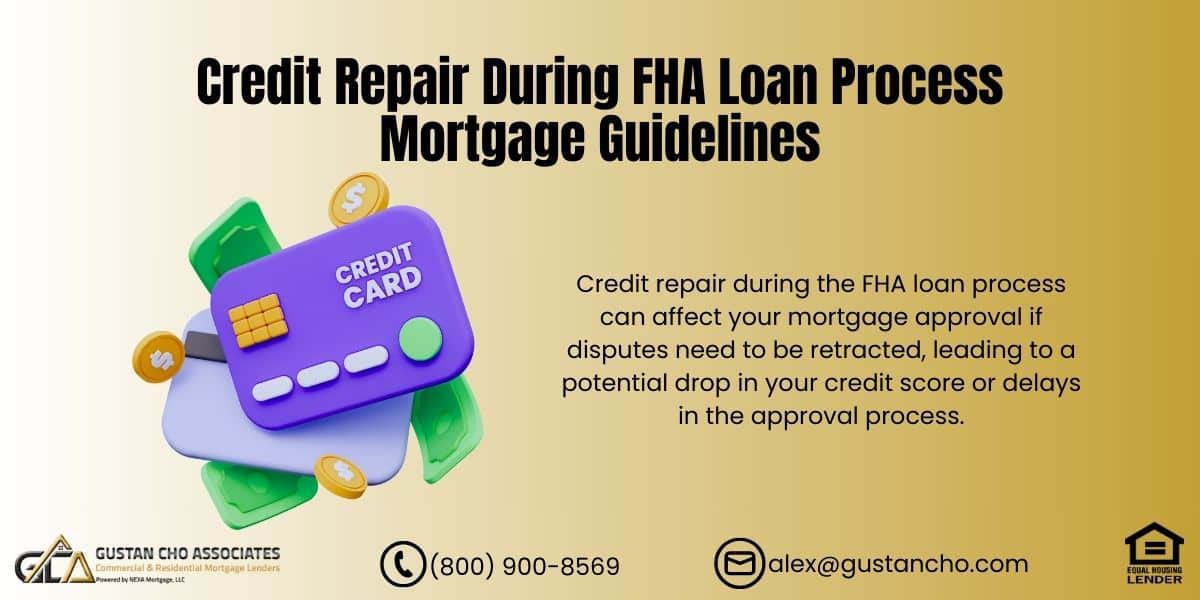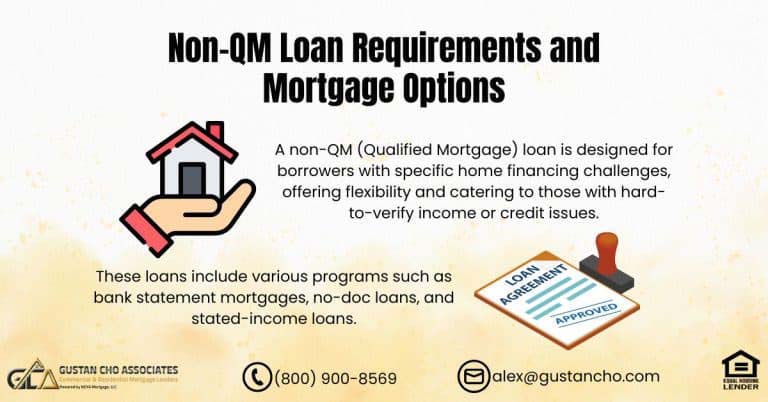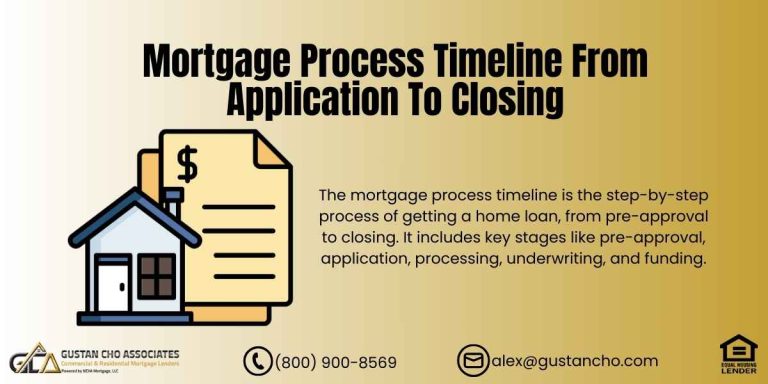Credit Repair During FHA Loan Process: What You Need to Know in 2024
If you’re considering buying a home using an FHA loan, you might wonder how credit repair could fit into the picture. Improving your credit score is crucial, but navigating credit repair during the FHA loan process requires careful consideration. This guide will help you understand how to repair your credit while applying for an FHA mortgage. It will show you what to do and what to avoid so you can protect your goal of owning a home.
What Is Credit Repair and Why Does It Matter?
Credit repair is cleaning up mistakes or bad marks on your credit history to improve your credit score. Why is this important? Improving your credit score can help you qualify for lower interest rates, such as when you’re applying for a mortgage to buy a home. When we talk about credit repair during the FHA loan process, it gets a bit more complicated.
If you’re applying for an FHA loan, which is a mortgage insured by the government for folks who might not have a big down payment or stellar credit, fixing your credit at the same time needs careful handling. You need to know what you’re doing so that your attempts to fix your credit will ensure your chance of getting the loan is maintained.
Take First Step Toward Making Your Dream A Reality
Apply Now And Get recommendations From Loan Experts
Why Credit Repair During FHA Loan Process Can Be Risky
It’s easy to assume that fixing your credit is always a good idea. But during the FHA loan process, it’s not that simple. Here’s why:
- Credit Disputes Can Freeze Your Approval: If you’re disputing items on your credit report, those disputes could stall your mortgage application. Lenders need a clear and accurate picture of your credit history to assess your eligibility. Disputed accounts may temporarily be excluded from your credit score, leading to an artificially inflated score that doesn’t reflect your true financial situation.
- Timing Matters: Disputing accounts during the loan process can trigger unexpected delays. If the disputes aren’t resolved quickly, your loan approval could be postponed, possibly costing you the home on which you’ve set your heart.
- Retraction of Disputes Can Lower Your Score: If you have active disputes, lenders may require you to retract them, which could cause your credit score to drop. This happens because the negative item you disputed is factored back into your score.
Understanding the FHA Loan Process
Imagine we’re breaking down the whole credit repair during FHA loan process into everyday language. The FHA loan is like a friendly helper for folks buying their first home or those who’ve hit a bump in the road with their credit score. It’s more forgiving than other home loans, making it a go-to for many. Here’s how it rolls out, step by step, in simple talk:
- Pre-Approval: First up, you’ll chat with the lenders to see if they think you’re good to go for a loan. They’ll peek at your credit score (that’s where the whole “credit repair” bit comes in handy), how much money you’re making, and how much debt you’re juggling to decide if you can handle a mortgage.
- House Hunting: Once you’ve got the thumbs up, it’s time to hit the streets (or the internet) looking for a place that fits your budget. It’s shopping time but for houses!
- Loan Application: Found your dream pad? Sweet. Now, you’ll complete official paperwork to request a loan to buy that place.
- Underwriting: This is when the lender puts on their detective hat. They’ll dig into all the details you gave them, ensuring everything adds up, and you’re a safe bet.
- Closing: If all the pieces fit and the lender gives a big nod, you’re on to the home stretch. You’ll seal the deal, get those keys, and move into your new spot.
During this whole process, it’s important to maintain a good credit score. A little “credit repair” can go a long way in ensuring you get that pre-approval and, ultimately, your new home. Remember, it’s all about showing lenders you’re reliable and can handle the loan.
The Dos and Don’ts of Credit Repair During FHA Loan Process
If you’re committed to repairing your credit during the FHA loan process, follow these guidelines to avoid potential pitfalls:
Do Consult Your Loan Officer Before Starting Credit Repair
Your first step should always be talking to your loan officer. They can advise whether credit repair is necessary or beneficial in your situation. Some credit issues may not need to be addressed before you can qualify for an FHA loan. For example, FHA guidelines allow some leniency with certain credit issues, such as medical collections.
Don’t Dispute Accounts During the Mortgage Process
Active credit disputes can complicate your mortgage application. While it’s tempting to dispute negative items on your credit report, doing so during the FHA loan process can cause delays or even disqualification. Lenders require an accurate view of your credit, and disputes can create an incomplete picture.
Do Focus on Paying Down Balances
One of the most effective ways to improve your credit score without triggering complications is to pay down high credit card balances. Reducing your credit utilization can boost your score, making you a more attractive borrower without involving disputes.
Don’t Attempt to Remove Public Records
Public records like bankruptcies, foreclosures, or tax liens are often a red flag for lenders. Trying to remove these through credit repair is not only difficult but may also raise suspicion with your lender. Instead, focus on rebuilding your credit through responsible financial habits and letting time lessen the impact of these records on your credit score.
Do Review Your Credit Report for Errors
While disputing items during the loan process is risky, you should still review your credit report for errors before applying for a mortgage. If you find inaccuracies, address them well before starting the loan process. Correcting errors early can prevent them from affecting your mortgage approval.
Looking to Repair Your Credit During the FHA Loan Process? We’re Here to Help!
Reach out today to discuss how we can help you repair your credit and keep your loan process moving smoothly.
How Credit Repair During FHA Loan Process Can Backfire
Credit repair isn’t always the silver bullet it’s made out to be. Here are some ways it can backfire if not handled correctly:
- Retraction of Disputes Can Drop Your Score: As mentioned earlier, retracting disputes can cause your score to drop. If your score dips too low, you might no longer qualify for the loan or could face higher interest rates.
- Lenders Will Find Public Records: Even if you manage to get a bankruptcy or foreclosure removed from your credit report, lenders will likely uncover it through third-party sources like LexisNexis or DataVerify. These records don’t just disappear and can still affect your loan approval.
- Credit Repair Can Delay Your Loan Approval: Disputing items or trying to remove negative accounts can slow down the underwriting process. Lenders may place your application on hold until disputes are resolved or retracted, costing you valuable time.
FHA Guidelines on Credit Disputes in 2024
If you’re looking into an FHA loan in 2024 and working on your credit repair during the loan process, it’s super important to know about certain rules related to credit disputes that might trip you up. Here’s a quick rundown:
Non-Medical Collection Disputes
If you have any non-medical bills in collections and you’re disputing them, make sure the total amount isn’t over $1,000. The FHA is strict about this because sometimes disputing these can make your credit score look better than it actually is since those disputed items aren’t counted in your score temporarily.
Medical Collection Disputes
If you’re disputing medical bills, that’s usually okay with the FHA. They don’t view these the same way as other types of collection accounts. But it’s still a good idea to discuss it with your lender before you start disputing anything.
Charge-Offs
Lastly, if you’ve got any charge-offs where you and the creditor have given up on the account, you can’t have active disputes during the loan process. The FHA sees these types of accounts as a big no-no and wants them either paid off or sorted out before you can move forward with your loan.
Hope that breaks it down nicely for you! Remember, these specifics are about making sure your loan doesn’t hit any snags, especially when you’re in the middle of credit repair during the FHA loan process.
Case Scenarios Where Credit Repair May Be Beneficial
When you’re thinking about fixing your credit score while getting an FHA loan, a few things might actually help.
- Deletion of Late Payments: First, if you’ve ever missed a payment, trying to get that mistake off your credit history before you start your loan application can boost your score. But, if those missed payments are super old, like over seven years, they’ll vanish on their own—no need to fuss over those.
- Reducing High Credit Utilization: Then, there’s dealing with your credit card debt. If you’ve maxed out your cards, paying some of that off can make your credit score jump quickly. You won’t need to dive into the whole credit repair during FHA loan process headache. It’s a straightforward way to look better to lenders.
- Settling or Negotiating Pay-for-Delete: Lastly, there’s this thing where you can make a deal with whoever you owe money to. You pay them; in return, they wipe the slate clean on your credit report. It’s a bit tricky, and you definitely want to sort this out before you dive into the FHA loan paperwork to keep things running smoothly.
So, while fixing your credit score can feel like tiptoeing through a minefield, especially when you’re in the middle of getting an FHA loan, there are smart moves you can make. Remember, tackling this before you start the loan process is your best bet.
How to Check Your Credit Report Before Applying for an FHA Loan
Before applying for an FHA loan, checking your credit score and correcting any errors are crucial. Think of it as a little cleanup to make sure everything is in tip-top shape. Here’s a simple way to do it:
- Get Copies of Your Credit Reports: You can get your credit reports from the three big guys in the credit world, TransUnion, Experian, and Equifax, without spending a dime. Just visit AnnualCreditReport.com, and you’re set.
- Review Your Reports for Errors: Check out your reports and look for things that just don’t look right. These could be accounts that aren’t yours, balance mistakes, or information that’s just too old to be there. Spot something off? It’s time to tidy up.
- Watch Out for Old Stuff: Stuff older than seven years needs to go bye-bye from your report. If it’s still hanging around, you can ask to have it removed.
- Focus on Non-Dispute Methods: When you find a mistake, aim to fix it without stirring up a dispute, especially during the credit repair during FHA loan process. This keeps things smooth and helps avoid any loan approval delays.
Remember, taking these steps not only helps clean up your credit report but also sets you up for a smoother FHA loan journey.
Credit Repair Companies: What to Watch Out For
When considering fixing your credit, especially when you’re looking at getting an FHA loan, you must be careful about which credit repair company you pick. Like any service, they’re not all the same, and picking a bad one can mess things up instead of fixing it. Here’s the lowdown:
Beware of False Promises
If a credit repair place says they can magically erase big mistakes like bankruptcies or foreclosures from your report, be skeptical. If it sounds too good to be true, it probably is. This is super important when considering credit repair during FHA loan process because you don’t want false promises to ruin your chances.
Avoid High Fees
Good credit repair companies aren’t about taking a ton of your money upfront. If they’re legit, they’ll charge you fair prices and actually focus on helping you sort out your credit in a way that’s above board. This is a big deal when you save every penny for that FHA loan down payment.
Stay Away from Identity Switcheroos
This one’s a biggie. If a company suggests getting a new Social Security number or changing your identity to fix your credit, run the other way. That’s illegal and could land you in more trouble than bad credit ever would.
When preparing for an FHA loan, keeping your credit repair legit and smart is key. You want to make sure your credit is as good as it can be, but you’ve also got to make sure you’re not falling for schemes that could backfire.
Need Credit Repair During Your FHA Loan Process? We Can Help You Qualify!
Reach out now to learn how we can assist you in qualifying for your FHA loan with improved credit.
Qualifying for an FHA Loan with Collections and Charge-Offs
If you’re looking for an FHA loan but have collections or debts that have been charged off on your credit report, there’s some good news. You might not need to clear those debts right away to be eligible. But those outstanding debts do play a role in figuring out if you can afford the loan.
Basically, lenders look at all your monthly debt payments compared to your income, a calculation known as your debt-to-income (DTI) ratio, to decide if you can handle a mortgage payment.
Managing or fixing issues on your credit report can be an essential step during the FHA loan process. This process, often called credit repair during FHA loan process, involves ensuring your credit report is accurate. It reflects your financial situation positively, which could help you qualify for the loan despite having collections or charge-offs.
FHA Guidelines on Collections and Charge-Offs in 2024
When you’re getting ready for an FHA loan in 2024, handling old debts on your credit report—things like unpaid bills that turned into collections or charge-offs—is important. Here’s how to think about it in simpler terms:
Collections Aren’t a Deal-breaker
If you’ve got some collections hanging around on your credit report, don’t stress too much. You can still get an FHA loan even if you haven’t paid these off. But, if the total of all your collections (except for medical ones) is more than $2,000, the lender will pretend you owe an extra 5% of that total when they determine if you can afford your loan.
Example: If your collections add up to $3,000, the lender acts as if you have another $150 monthly debt. This could affect your loan application, as debt management is important, especially during credit repair during FHA loan process.
Charge-Offs Can Stay Too
Got charge-offs? That’s okay. Like collections, you don’t have to settle these debts to qualify. But, you can’t be fighting about them during your loan application. It’s better to resolve these issues before starting your loan process for a smoother ride.
Medical Bills are Chill
Here’s some good news—those medical collections don’t weigh you down. They won’t count against your debt when your lender sees if you can afford the loan, which is cool. You can even dispute them without causing problems for your FHA loan.
Overall, it’s wise to know these rules when fixing your credit during the FHA loan process. They can help you understand what needs immediate attention and what doesn’t, allowing for better planning and a smoother application journey.
How to Improve Your Credit Without Disputes
When aiming to fix your credit while you’re getting an FHA loan, there’s a smarter route to take that will ensure your chances of landing that mortgage are maintained. Here’s what you can do:
- Pay Down Debt: Work on cutting down what you owe, especially on your credit cards. It’s like hitting the fast-forward button to improve your credit score because it shows you’re not always maxing out your credit.
- Pay Bills On Time: Make absolutely sure you pay every bill promptly, more so when you’re about to apply for a mortgage. Falling behind, even just once, can set you back.
- Hold Off on New Credit: Steer clear of opening up new credit lines or piling on more debt when applying for a mortgage. When lenders see you’re shopping around for more credit, it worries them and can ding your score a bit, too.
- Consider a Rapid Rescore: If you’ve paid off a significant amount of debt or fixed any mistakes on your credit, let your lender know. They might be able to perform a rapid rescore, which is essentially a quick update to your credit report to reflect these positive changes right away.
Remember, while you’re navigating the credit repair process during FHA loan process, these steps can really boost your score and keep your loan application looking good.
Final Thoughts: Is Credit Repair During FHA Loan Process Worth It?
Credit repair can be a double-edged sword during the FHA loan process. While improving your credit is always a good goal, the timing and method matter greatly. Before you dive into credit repair, consult with your loan officer to determine if it’s necessary and how it might affect your mortgage application. By understanding the FHA rules and following the guidelines in this guide, you can fix your credit without risking your dream of owning a home.
If you’re ready to take the next step toward homeownership, speak with an experienced loan officer today. They can help you assess your credit, explore your options, and confidently guide you through the FHA loan process.
Get Started on Your Homeownership Journey
Ready to move forward? Feel free to reach out to us today to discover the FHA loan choices that are available to you and receive custom recommendations that suit your financial circumstances. Whether you need help with credit repair or want to understand your next steps, we’re here to help you achieve your homeownership goals in 2024.
FAQs: Credit Repair During FHA Loan Process Mortgage Guidelines
- 1.What is credit repair during the FHA loan process? When applying for an FHA mortgage, improving your credit score by fixing errors or negative items on your credit report is important. This helps to avoid delays or issues with your loan approval.
- 2. Is it safe to do credit repair during the FHA loan process? It can be risky. Disputing accounts or trying to remove negative items could stall your mortgage application or even lower your credit score if disputes are retracted.
- 3. Can I dispute items on my credit report during the FHA loan process? Disputing items during the FHA loan process is generally not recommended. Active disputes can lead to delays or disqualification, as lenders need an accurate and complete view of your credit history.
- 4. What should I do instead of disputing items during the FHA loan process? Instead of disputing items, focus on paying down high credit card balances and ensuring timely payments. These actions can boost your credit score without triggering complications during the FHA loan process.
- 5. How does credit repair during the FHA loan process affect my mortgage approval? Credit repair during the FHA loan process can affect your mortgage approval if disputes need to be retracted, leading to a potential drop in your credit score or delays in the approval process.
- 6. What are the FHA guidelines on credit disputes in 2024? In 2024, FHA guidelines do not allow disputes on non-medical collections over $1,000 during the mortgage process. Disputes on medical collections are generally allowed but should still be discussed with your lender.
- 7. Can I qualify for an FHA loan with collections on my credit report? It is feasible to qualify for an FHA loan even if collections are listed on your credit report. Nevertheless, if the combined non-medical collections exceed $2,000, lenders must assess a potential debt, which might impact your loan approval.
- 8. How can I improve my credit during the FHA loan process without disputes? You can improve your credit during the FHA loan process by paying down credit card debt, making timely payments, avoiding new credit, and considering a rapid rescore if you’ve made significant positive changes.
- 9. Should I hire a credit repair company during the FHA loan process? Be careful if you decide to hire a credit repair company during the FHA loan process. Avoid companies that guarantee the removal of bankruptcies or charge high upfront fees, as these could be warning signs.
- 10. What happens if I retract a credit dispute during the FHA loan process? If you retract a credit dispute during the FHA loan process, your credit score might drop because the negative item is factored back into your credit score. This could impact your loan approval or the terms offered.
If you have any questions about Credit Repair During FHA Loan Process, please contact us at 800-900-8569. Text us for a faster response. Or email us at alex@gustancho.com. The team at Gustan Cho Associates is available 7 days a week, on evenings, weekends, and holidays.
This blog about Credit Repair During FHA Loan Process Mortgage Guidelines was updated on August 20th, 2024.
Worried About Your Credit During the FHA Loan Process? Let Us Help You Repair It!
Contact us today to discuss how we can guide you through improving your credit for approval.










